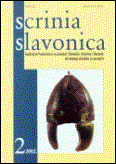ŽIDOVI U KOŠKI
THE JEWS IN KOŠKA
Author(s): Zdenko SamaržijaSubject(s): Jewish studies
Published by: Hrvatski institut za povijest
Summary/Abstract: In the second half of the 19th century, during the time of the vigorous felling of the woods of the Koška Chase, numbers of smiths, wheelwrights, joiners and carpenters, and also traders, Jews, moved into Koška. In this difficult transition period (when financial business was making its way in only slowly) trade was small-scale, and in Koška there were just one or two Jewish families. At the end of the 19th century and in the first decades of the 20th, at the time of Koška’s greatest development in industry and transportation, the area was hit by a new wave of immigration – railway workers, workers engaged in felling the woods, of German, Czech, Slovakian, Polish and Hungarian origin, and the Jewish traders. They had a great influence on the Croat inhabitants of Koška. In these years there was a great intermingling of languages, customs, tools and production techniques. The intersection of the railway line and other very fine infrastructure meant constant immigration into Koška right down to 1936, when the intensive felling of the woods stopped. A dozen or so Koška people were educated in the Osijek high schools (the first high school pupil from Koška was a Jew, Josip Ehrlich), and the greatest change came about in the transformation of leisure time; a football club was founded in 1919, a Sokol organisation in 1930, a hunting club in 1919, and the volunteer fire brigade, founded in the early part of the century, was revived in 1926. Apart from putting out fires, this group also had a drama troupe. Alongside the other people of Koška, the Jews also took part in the work of these organisations. In the 1930s, Koška, within the parliamentary democracy of monarchical Yugoslavia, took a step forward to becoming a contemporary village. The Jewish community had a considerable influence in this transformation. In 1942 the Jewish population in Koška was annihilated. The conduct of the authorities of the Independent State of Croatia to the Jews and Romany led to Koška people going off into the anti-fascist units.
Journal: Scrinia Slavonica
- Issue Year: 2002
- Issue No: 2
- Page Range: 353-362
- Page Count: 10
- Language: Croatian

